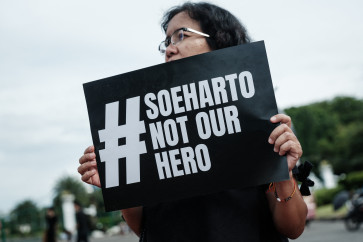Popular Reads
Top Results
Can't find what you're looking for?
View all search resultsPopular Reads
Top Results
Can't find what you're looking for?
View all search resultsInsight: BPMigas dissolution: A political comedy
The recent Constitutional Court decision declaring upstream oil and gas regulator BPMigas unconstitutional highlights how political interference produces major setbacks for the nation
Change text size
Gift Premium Articles
to Anyone
T
he recent Constitutional Court decision declaring upstream oil and gas regulator BPMigas unconstitutional highlights how political interference produces major setbacks for the nation. There are three reasons why we believe this move is political in nature rather than based on sound political-economic logic.
Let’s start with the final act before proceeding to Act 1. Scene: Constitutional Court, with a judicial review proposed by 30 people and 12 organizations, mainly represented by the country’s two largest Muslim organizations, Muhammadiyah and Nahdlatul Ulama, and several other Islamic and non-governmental organizations. Supporting actors: Kwik Kian Gie, Rizal Ramli, Kurtubi and Constitutional Court chairman Mahfud MD. Verdict: BPMigas is unconstitutional. Only one judge wrote a dissenting opinion.
The decision from the Constitutional Court brings disgrace and shame to the government and the House of Representatives. But, which government and which House? It brings disgrace and shame to the government and legislature that drafted the ruling. It is interesting how the public seems to have a very short memory.
Let’s go back and look at what really happened in the first acts of this drama. The deliberation and the enactment of the law occurred in 1999-2001 (under the presidency of Abdurrahman “Gus Dur” Wahid and later Megawati Soekarnoputri). Now, let’s see the roles of the plaintiffs or the groups during that time. It is still fresh in our minds how the Central Axis Parties — a coalition of the National Mandate Party (PAN), the United Development Party (PPP), the National Awakening Party (PKB), the Justice Party (PK) and the Crescent and Star Party (PBB) — brokered a deal and pushed Gus Dur forward as president.
The People’s Consultative Assembly (MPR) speaker back then was Amien Rais, former chairman of PAN and Muhammadiyah. Under that government, one of the plaintiffs in the recent case, Rizal Ramli, was then coordinating economic minister/finance minister. Under Megawati’s administration, when the so-called “unconstitutional” Oil and Gas Law was enacted, Kwik Kian Gie, another plaintiff, also held a very strategic and pivotal role as the coordinating economic minister.
The comedy continues with the fact that the chairman of the House’s Commission VIII, which endorsed the law, was Irwan Prayitno from the Justice Party. The chief of constitutional court, Mahfud MD was incidentally also one of the government officials who enacted the bill. He was the defense minister during president Gus Dur’s administration and held the position of an honorary chairman of the Association of Nahdlatul Ulama Graduates (ISNU).
What they effectively implied is that the Oil and Gas Law, which was enacted when they were high-ranking officials/members of the House, was unconstitutional! I think now is the precise time for the public to ask: What were you doing while the Oil and Gas Law was being deliberated and enacted?
It is worth noting that nine of the 10 factions in the House agreed to enact the law. It is ironic that none of the Islamic-based parties objected the enactment of the law, only the Love the Nation Democratic faction (FDKB) — a Christian-based party — stood in opposition to the law. What about the two former ministers, Kwik Kian Gie and Rizal Ramli? Did they challenge or oppose the enactment of the law while they had the power to do so?
Second, the decision of the Constitutional Court to nullify the Oil and Gas Law is also a big slap in the face of the current administration. This is the second time the government of Indonesia has lost at the Constitutional Court on energy issues. The recent verdicts against the government/state-owned enterprises are mounting. Newmont’s divestment case, the judicial review of Law No. 4/2009 on mineral and coal mining, the bankruptcy of Telkomsel and the most recent judicial review of Law No. 22/2001 that led to the dissolution of BPMigas have proven that the government has been frivolous to fight for its sovereignty.
From court documents we can see clearly how the government reacted (i.e. by choosing experts, mainly from the bureaucracy or legal experts who use their own technical language, who are not easily accessible to stakeholders). In the hearing, the defendants explained the legal aspects of oil and gas that were too high level and bureaucratic in nature. Meanwhile, the opposition consisted of several figures that were very media savvy and good at gaining public attention to win the sympathy of the judges. Thus, we can see the result was catastrophic as it created a conflict between government bodies and stakeholders, entrenched negative perceptions and provided excellent material for negative publicity.
After all, politics may have played a very important role here — the last three people selected to fill the position of energy and mineral resources minister have been figures very close to President Susilo Bambang Yudhoyono, with two of the last ministers coming from the President’s own Democratic Party.
I would like to conclude by quoting Tolstoy: “Happy families are all alike; every unhappy family is unhappy in its own way”. Successful countries with oil and gas regimes are all alike; every unsuccessful country with an oil and gas regime is unsuccessful in its own way. It takes a lot of effort and attention to a number of factors to get something done successfully, but it only takes one thing to destroy it … and our politician comedy has just done that!
The writer is founder of Independent Research Advisory Indonesia.










